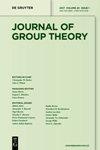On the converse of Gaschütz’ complement theorem
IF 0.5
3区 数学
Q4 MATHEMATICS
引用次数: 3
Abstract
Abstract Let 𝑁 be a normal subgroup of a finite group 𝐺. Let N ≤ H ≤ G N\leq H\leq G such that 𝑁 has a complement in 𝐻 and ( | N | , | G : H | ) = 1 (\lvert N\rvert,\lvert G:H\rvert)=1 . If 𝑁 is abelian, a theorem of Gaschütz asserts that 𝑁 has a complement in 𝐺 as well. Brandis has asked whether the commutativity of 𝑁 can be replaced by some weaker property. We prove that 𝑁 has a complement in 𝐺 whenever all Sylow subgroups of 𝑁 are abelian. On the other hand, we construct counterexamples if Z ( N ) ∩ N ′ ≠ 1 \mathrm{Z}(N)\cap N^{\prime}\neq 1 . For metabelian groups 𝑁, the condition Z ( N ) ∩ N ′ = 1 \mathrm{Z}(N)\cap N^{\prime}=1 implies the existence of complements. Finally, if 𝑁 is perfect and centerless, then Gaschütz’ theorem holds for 𝑁 if and only if Inn ( N ) \mathrm{Inn}(N) has a complement in Aut ( N ) \mathrm{Aut}(N) .关于gasch兹补定理的逆
摘要设无穷大群𝐺的正规子群。设N≤H≤G N \leq H \leq G使得在𝐻中存在一个补元并且(| N |, | G:H |)=1 (\lvert N \rvert, \lvert G:H \rvert)=1。如果抛掷是阿贝尔的,则抛掷的一个定理断言抛掷在𝐺中也有一个补。Brandis问过,是否可以用一些较弱的性质来代替二进制运算的交换性。证明了当所有的Sylow子群都是阿贝时,在𝐺中存在一个互补。另一方面,我们构造了Z≠(N)∩N '≠1 \mathrm{Z} (N) \cap N^ {\prime}\neq 1的反例。对于亚元群,条件Z≠(N)∩N ' =1 \mathrm{Z} (N) \cap N^ {\prime} =1暗示了补的存在性。最后,如果操作端是完美且无中心的,那么对于操作端,当且仅当Inn (N) \mathrm{Inn} (N)在Aut (N) \mathrm{Aut} (N)中有补时,gasch兹定理成立。
本文章由计算机程序翻译,如有差异,请以英文原文为准。
求助全文
约1分钟内获得全文
求助全文
来源期刊

Journal of Group Theory
数学-数学
CiteScore
1.00
自引率
0.00%
发文量
45
审稿时长
6 months
期刊介绍:
The Journal of Group Theory is devoted to the publication of original research articles in all aspects of group theory. Articles concerning applications of group theory and articles from research areas which have a significant impact on group theory will also be considered.
Topics:
Group Theory-
Representation Theory of Groups-
Computational Aspects of Group Theory-
Combinatorics and Graph Theory-
Algebra and Number Theory
 求助内容:
求助内容: 应助结果提醒方式:
应助结果提醒方式:


